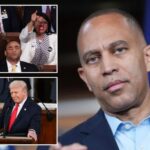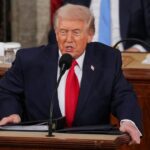
Last week, the Producer Price Index data finally showed some cooling of wholesale prices. That coupled with better-than-expected CPI data further buoyed hope that the Fed is winning the war on inflation. But in his podcast, Peter Schiff emphasized that easing inflation is transitory. And a weakening dollar will be a big part of the story.
Markets rallied after the PPI data came out last week.
The markets liked this number and that was part of the reason for a rally that day — the reaction to this better-than-expected news on inflation. But you have to remember that all of this better-than-expected news on inflation is transitory. So, it wasn’t the increase in inflation that was transitory. That’s permanent. What is transitory is this slight decrease that we’re enjoying now.”
It’s important to remember that even though the rate of increase is slowing down, prices are still going up.
They’re just not going up as fast as they were. But all of that is temporary because the reason that we saw a decline in the rate of increase in prices was because we got a correction in commodities, in particular oil prices. We’ve also got a decline in longer-term interest rates. That has affected mortgage rates and probably other debt payments that are being made. That is helping to reduce somewhat the rate of increase in costs businesses are experiencing. But all these factors are temporary.”
Peter noted that commodity prices have already reversed their decline.
One of the reasons commodity prices fell was the strength of the dollar. But the dollar completely reversed in the fourth quarter. On Sept. 27, just before the start of Q4, the dollar index reached 114.11. That was the highest level of the year. From there the dollar index fell by nearly 8%. Today, the DIX is hovering just above 101.
Peter said he expects this dollar weakness to continue for the balance of the year.
I still think that 2023 could end up being one of the worst years ever, and maybe the worst year ever for the US dollar, and that weakness is going to help propel consumer prices much higher. So, I believe that after this transitory reduction in the acceleration of the inflation rate, I think we’re going to head higher again and that before the year is over, we’re going to be printing year-over-year increases in the CPI that will eclipse the high from last year.”
Peter also covered some of the most recent economic data that came out last week. For instance, the Philadelphia Fed Manufacturing Index for January came in weak. And existing home sales also underscored the growing weakness in the housing market. In 2022, existing home sales fell by 34%. That was the single biggest drop in home sales ever.
That means the drop is bigger than it was during COVID. It’s bigger than it was at any point during the 2008-2009 financial crisis.”
Peter said this has very ominous implications for the economy in 2023 because a lot of economic activity that shows up in GDP is related to home sales.
So, all those people who are still clinging to the false hope that the economy is going to experience a soft landing are not reading any of the very bold upper-case letters clearly written on this collapsing wall.”
In this podcast, Peter also talks about the rollover in growth stocks, gold making a 9-month high last week, job losses in the tech sector, the wasteful meeting in Davos, and how a Netflix documentary on Bernie Madoff proves more regulations won’t help us.
Last week, the Producer Price Index data finally showed some cooling of wholesale prices. That coupled with better-than-expected CPI data further buoyed hope that the Fed is winning the war on inflation. But in his podcast, Peter Schiff emphasized that easing inflation is transitory. And a weakening dollar will be a big part of the story.
Markets rallied after the PPI data came out last week.
The markets liked this number and that was part of the reason for a rally that day — the reaction to this better-than-expected news on inflation. But you have to remember that all of this better-than-expected news on inflation is transitory. So, it wasn’t the increase in inflation that was transitory. That’s permanent. What is transitory is this slight decrease that we’re enjoying now.”
[embedded content]
It’s important to remember that even though the rate of increase is slowing down, prices are still going up.
They’re just not going up as fast as they were. But all of that is temporary because the reason that we saw a decline in the rate of increase in prices was because we got a correction in commodities, in particular oil prices. We’ve also got a decline in longer-term interest rates. That has affected mortgage rates and probably other debt payments that are being made. That is helping to reduce somewhat the rate of increase in costs businesses are experiencing. But all these factors are temporary.”
Peter noted that commodity prices have already reversed their decline.
One of the reasons commodity prices fell was the strength of the dollar. But the dollar completely reversed in the fourth quarter. On Sept. 27, just before the start of Q4, the dollar index reached 114.11. That was the highest level of the year. From there the dollar index fell by nearly 8%. Today, the DIX is hovering just above 101.
Peter said he expects this dollar weakness to continue for the balance of the year.
I still think that 2023 could end up being one of the worst years ever, and maybe the worst year ever for the US dollar, and that weakness is going to help propel consumer prices much higher. So, I believe that after this transitory reduction in the acceleration of the inflation rate, I think we’re going to head higher again and that before the year is over, we’re going to be printing year-over-year increases in the CPI that will eclipse the high from last year.”
Peter also covered some of the most recent economic data that came out last week. For instance, the Philadelphia Fed Manufacturing Index for January came in weak. And existing home sales also underscored the growing weakness in the housing market. In 2022, existing home sales fell by 34%. That was the single biggest drop in home sales ever.
That means the drop is bigger than it was during COVID. It’s bigger than it was at any point during the 2008-2009 financial crisis.”
Peter said this has very ominous implications for the economy in 2023 because a lot of economic activity that shows up in GDP is related to home sales.
So, all those people who are still clinging to the false hope that the economy is going to experience a soft landing are not reading any of the very bold upper-case letters clearly written on this collapsing wall.”
In this podcast, Peter also talks about the rollover in growth stocks, gold making a 9-month high last week, job losses in the tech sector, the wasteful meeting in Davos, and how a Netflix documentary on Bernie Madoff proves more regulations won’t help us.
Loading…







